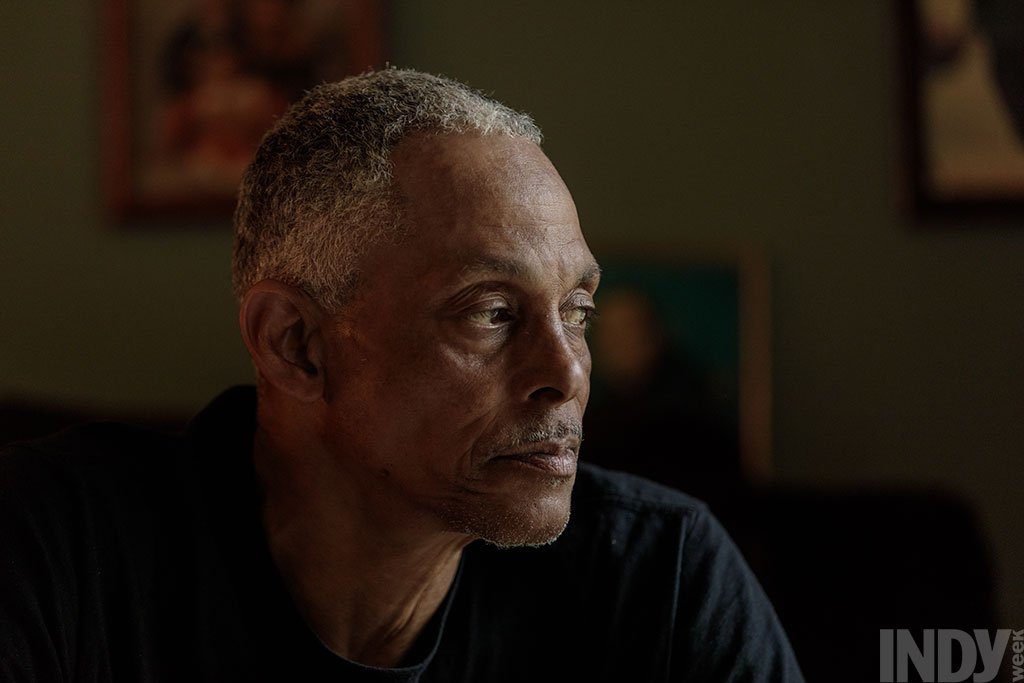By Sarah Willets | Originally published March 13, 2019 in Indy Week

Advocates Say Durham’s Experiment to Wipe Thousands of Old Cases Off the Books Could Be a Model for Statewide Justice Reform
Linwood Thornton had just accepted that he’d never drive legally again.
His license had been suspended since June 2, 1989. A relative used his identity and got a speeding ticket that January, he says, and he didn’t know about it until he was pulled over that September, after spending three months in prison. Only then did he learn his license had been suspended for missing the court date, which he thinks occurred while he was locked up. (Court and jail records don’t go back far enough to confirm all of his story.)
Thornton went on with his life. He and his wife had five kids, and he started a home improvement business. But the suspension loomed over him. It limited what jobs he could take and what vehicles he could add to his business. It cost him time spent waiting for rides. And when he had no choice but to drive, he got new tickets for driving with a revoked license, which he couldn’t afford to pay—and three more license suspensions, a cycle that seemed insurmountable.
Eventually, he gave up.
So when he and his wife, Rosa Ann—whose license is also suspended—first heard from his brother’s girlfriend about something called the Durham Expunction and Restoration program, an initiative that began in December to connect people to free legal help with license restoration, he thought it was too good to be true.
“I just thought someone was jiving. I didn’t think it was real,” says Thornton, a tall man with an affable twang. “Me and my baby jumped up and boogied to the courthouse.”
On January 23, they arrived on the sixth floor of the Durham County courthouse, where DEAR shares a space with the county drug court. Five other people were in the waiting room talking about all they’d lost because they couldn’t legally drive.
“All our stories are the same,” Thornton said.
One woman said she spent nearly $100 a week on ride-sharing services to get to work at Durham Public Schools. If she had to drive—when she didn’t have the money or couldn’t get a ride—she was too anxious to turn the radio on.
“If you don’t have a license, you don’t really have nothing,” a man added, eliciting knowing nods. “If you don’t have a license, it’s like you don’t exist.”
While other counties provide assistance for those with license suspensions, Durham’s model—a collaboration between the city of Durham, the courts, the NC Justice Center, Legal Aid, the NC Equal Access to Justice Commission, the NC Pro Bono Resource Center, local law schools, and Code for Durham—offers relief on an unprecedented scale, and not just for traffic issues, but for lingering criminal charges as well.
By early March, DEAR had had dismissed more than 70,000 cases (most for traffic charges tied to license suspensions), waived more than $200,000 in unpaid traffic fines and court fees (on average thirteen years old) for more than 1,200 people, and helped more than 120 others start the process of getting their criminal records expunged.
The program isn’t doing anything not already allowed under state law. Instead, its attorneys and partners are using data and court records to maximize access to existing methods of assistance, under the belief that a justice system that disproportionately targets low-income people and communities of color should bear responsibility for correcting those disparities.
Other counties are watching to see how Durham’s experiment with mass relief works out. The program’s advocates think it could be a model that’s eventually rolled out across the state. If there’s enough political will—and enough resources—they say, hundreds of thousands of residents could be given second chances.
“It is a second chance, but the law gives this second chance to everyone, so everyone should have the opportunity to get it,” says District Court Judge Amanda Maris. “If you want to take it deeper, you have to ask the question—for some, were you given a first chance?”

The DEAR program began years before it had a name or a spot on the courthouse directory.
Its license restoration work grew out of an effort by the Durham Innovation Team and the District Attorney’s Office to help suspended drivers. Backed by a $1.2 million Bloomberg Philanthropies grant and tasked with looking at how to reduce economic barriers for justice-involved people, the I-Team found that more than fifty-four thousand Durham residents had their licenses suspended for either failing to appear in court for traffic offenses—like speeding or lapsed registration—or for not paying court fees and fines related to traffic violations. These cases go back to 1987. Most involve people of color.
In North Carolina, licenses are suspended indefinitely for failure to appear or failure to pay. That’s left about 1.2 million North Carolinians unable to drive legally, according to an analysis by the Legal Aid Justice Center—about 15 percent of the state’s driving-age population. The suspension happens automatically, regardless of the person’s ability to pay—which prompted civil rights groups to sue the state last year, alleging that the law violated due process and equal protection rights. The suspension isn’t reversed until the underlying reason is resolved—in other words, when the person comes to court or pays their debt. And even this doesn’t automatically restore driving privileges; people still need to take a driving test, get insurance, and pay up to $115 in fees to have their licenses restored.
When the I-Team and the DA’s Office held a driver amnesty program in 2017, about five hundred people got their outstanding charges dismissed. But almost as many ended up not being eligible.
“We just had to do something again because so many people were saying they needed help,” says Superior Court Judge Josephine Kerr Davis, who led the program as an assistant district attorney.
Around the same time, Maris, a former public defender, was trying to bring together organizations that help with expunctions, or court orders that scrub old charges and convictions from criminal records.
Maris saw an opportunity to reach more people. A 2017 state law had expanded who was eligible: It shortened mandatory waiting periods to expunge convictions and, significantly, eliminated a once-in-a-lifetime limit on expunging charges that resulted in a dismissal or not-guilty finding. Yet Durham residents filed only 383 expungement petitions that year. In the previous five years, eighty-seven thousand charges had been dismissed or ended with a not-guilty verdict in the county.
The I-Team suggested bringing license restoration and expunction under the same umbrella. The Durham Expunction and Restoration Clinic, or DEAR, was born.
Both sides of the initiative seek to solve cyclical problems: License suspensions lead to more tickets, which lead to more suspensions, “especially if you live in a community where the police are very prevalent,” says District Attorney Satana Deberry. These suspensions can not only keep people from getting around, but they can also disqualify people from jobs and even lead to jail time over unpaid debt. They often far outlast whatever punishment a court would have handed down for the underlying offense.
In the same way, a criminal record is often a barrier to employment and housing after people have completed their sentences. With limited options, they’re more likely to re-offend.
To get an expunction or a license restored, people need lawyers, but most people who need them don’t have the means to hire one. The result is a huge gap between the number of people who are eligible to get help and those who actually do.
“The justice system breaks down when we don’t have full access,” says Maris. “[DEAR] is about expanding access to relief that already exists but isn’t equally being doled out.”
A few months in, the R part of DEAR—restoration—is further along than expunction. The I-Team already had license suspension data and experience from the amnesty program. Restoration is also easier to tackle on a large scale. While a person has to file a petition to have a record expunged, that’s not the case with restorations: District attorneys can dismiss charges (including those tied to license suspensions) and judges can waive fines and fees without the suspended driver doing a thing.
Learning from the 2017 amnesty program, DEAR’s partners decided to set broad eligibility criteria—cases must be at least two years old, and “high-risk” violations such as driving while impaired and trying to elude arrest are eliminated—proactively identify people who qualify, and dismiss the underlying charge or ask a judge to cancel the unpaid debt.
Other Triangle jurisdictions were already addressing suspended licenses before Durham developed DEAR. Wake County, for instance, has been doing license-restoration clinics for years, and it’s now creating a court session for judges to forgive unpaid traffic debts. Likewise, the Orange County DA’s Office has asked its Board of Commissioners for an additional position to help process license suspensions.
The difference: These are done on a case-by-case basis. That approach is safer, holds people accountable, and is fairer to people who resolved their traffic cases, argues Orange County assistant district attorney Jeff Nieman.
“We just don’t think it’s necessarily the best message to send to the public that we went in and just dismissed seventy thousand tickets,” Nieman says “That’s incredibly efficient, but inevitably, you run the risk of being less fair. Are you dismissing charges for someone who is a repeat traffic offender, and the public would expect there should be some more accountability?”
Deberry and assistant district attorney Dale Morrill, the main Durham prosecutor working with the DEAR program, say everyone benefitting from DEAR has been held accountable by, at minimum, having their license suspended for two years—and dangerous drivers are screened out. And everyone else benefits by having them legally licensed.
According to the American Association of Motor Vehicle Administrators, three-fourths of people with suspended licenses drive anyway. They just do so without insurance or passing driving exams. Given that there were nearly fourteen thousand vehicle accidents in Durham County in 2017, the third highest number in the state, this isn’t a small consideration.
If a few people who simply skipped court catch a break along with the others, that’s worth it, proponents say.
“A person that typically gets a license revoked, they can’t pay,” says Morrill, who has prosecuted traffic cases in Durham for nearly fifteen years. “It started out typically with no operator’s license, or an inspection, or registration, and it just completely, not even snowballed, it fell off the cliff. License revoked, license revoked, license revoked, license revoked. What if we could put a license in their hand? That’s the question. If we’re able to do that and get them driving, that opens up a world of opportunity.”

For cases in which people had their licenses suspended for missing court, DEAR has taken advantage of a state program designed to efficiently eliminate backlogs of old charges. Through the Administrative Office of the Courts’ Data Integrity Program, Kerr Davis—during her last week as an assistant district attorney in December—dismissed 72,441 cases. Among them was the speeding case that led to Linwood Thornton’s first and longest license suspension, though Thornton didn’t find out until months later. (The other suspensions remain on his record.)
First, Kerr Davis and outgoing District Attorney Roger Echols chose which categories of offenses and what timeframe to target. The AOC returned a massive spreadsheet of cases in Durham County, and Kerr Davis spent several days individually signing about seven thousand pages of printouts to authorize their dismissal. About fifty thousand cases dealt with traffic matters; the others were nonviolent criminal cases too old to prosecute.
The Data Integrity Program hadn’t been used in this way before. The cases Kerr Davis dismissed accounted for about a third of what the state program had processed by the end of January.
DEAR also identified eleven thousand people with failure-to-pay cases that met its eligibility criteria. Because of how long it takes to prepare each case, they were divided up into dozens of dockets. Beginning in December, the District Attorney’s Office began asking judges to forgive the outstanding debt, most of which is court costs rather than actual traffic fines. It’s unlikely this debt would have been paid; data from the AOC shows that collections drop off a cliff after two years.
But while DEAR has helped tens of thousands of people, many of those people—like Thornton—don’t know they’ve been helped. Left with decades-old addresses, DEAR has been unable to reach them. To remedy that, DEAR launched a website—SecondChanceDriving.org—so people can check if they’ve had an old charge dismissed or traffic ticket waived. The program is also hiring community organizers to spread the word about the website.
“If we think it’s the right thing to do and we want the most people to benefit from expunction or license restoration, we need to design it in a way that’s going to reach as many people as possible,” says I-Team director Ryan Smith.
DEAR hoped to waive debts for two hundred people every week and make its way through the backlog in a year, but that proved to be too burdensome for the clerk’s office.
It takes two people about four hours to prepare forty cases for court, then another forty-five minutes to create and check a docket for the court session. The process doesn’t include the time it takes a judge to look at and sign the motions in each case, or the time it takes the courtroom clerks to pair those documents with the original files or put all those files back on the shelf. So the process has been scaled back to three hundred cases every other week.
(Staffers in the clerk’s office say switching to electronic records—instead of the current analog system—would cut the time they spend preparing DEAR cases in half. But while the state AOC plans to revamp its technology, it won’t do so in the near future.)
On the expunction side, DEAR’s court referral program sends people to the DEAR office as soon as they are found not guilty or their charges are dismissed to file a petition or be referred to a network of providers. Filing an expunction petition takes about forty-five minutes; it takes the courts and the State Bureau of Investigation another four to six months to review it. (DEAR also helps with certificates of relief, which alleviate some of the consequences of a conviction for cases that don’t qualify for an expunction.)
Dionne Gonder, a DEAR advisory board member and N.C. Central law professor who has done expunction work for about a decade, says people often don’t realize the need to expunge charges from their records until the charges show up on a background check when they’re applying for a job.
They also don’t realize that serious charges that have been dismissed can prove more problematic on background checks than lower-level convictions, says Daniel Bowes, an attorney with the NC Justice Center working with the DEAR program. Employers, he says, might not notice that the charges were dismissed, or they might judge the person anyway.
Eventually, DEAR wants to put a kiosk in the courthouse lobby to walk people through the process of expunging dismissed charges and not-guilty findings on their own, freeing up attorneys to work on expunging convictions, which are more complicated. From there, the goal is to turn that kiosk into an app that anyone in the state can use.
That’s just one way DEAR—which is funded through October, though Smith, the I-Team director, says he hopes to secure funding to keep it going in some form after that—is being built as a model. Other North Carolina counties could use a version of the court-referral process for expunctions, use the state’s Data Integrity Program to drop old charges en masse, or be incorporated into the DEAR website so that people can see if they’ve had charges or debt erased.
But for other counties to adopt the model, they’ll need to commit resources—and they’ll need to see the value in extending relief to as many people with as few barriers as possible. DEAR is figuring out how to do that efficiently in real time, and whether other counties follow suit could hinge on the results.
“We don’t just want people talking to each other—although that’s incredibly helpful in any system, particularly the justice system. We want results,” says Jennifer Lechner, a DEAR advisory board member and executive director of the NC Equal Access to Justice Commission. “I think that’s what DEAR is going to show us. How many licenses can we restore in a given population when everyone is working toward the same goal? How many expungements can we do? How many people can we put back to work and back to having reliable transportation? Those are ultimately the impacts on clients’ lives that we’re looking for.”
Not only is DEAR dealing with these cases on a larger scale than other counties have, but the amount of resources being put into the program marks a change in approach. The program, which became fully staffed in February, has four attorneys based in the courthouse—two full-time on loan from the city attorney’s office and two part-time—as well as a paralegal. The city is also contributing $250,000 from the $400,000 it set aside to match the Bloomberg grant. Even if they do like the mass-relief approach, other counties may not have the budget to make it work.
“If we’re serious about shared prosperity, we’ve got to include everybody,” says Durham Mayor Steve Schewel. “For eighty percent of us, we’re doing great in Durham. These people are among the twenty percent; can we remove some of the very small but important barriers that would make it possible for them to share in our new prosperity?”
DEAR’s partners say license restoration requires a regional, if not statewide, approach—people often cross county lines and have suspensions in multiple jurisdictions. Some counties—including Forsyth, New Hanover, Guilford, and Mecklenburg—have contacted DEAR about following its model, and Lechner says the Equal Access Justice Commission plans to use a grant to spur similar work in three other places in the state.
“I think a lot of jurisdictions will come at this based just on a human toll, but there’s many reasons to come at this,” says Bowes, who lobbies the state on criminal justice reform. “It truly is just a picture of a broken system.”
There appears to be bipartisan interest in fixing some aspects of that broken system. Durham Democrats Floyd McKissick and Marcia Morey have filed bills in the state Senate and House, respectively, to make expungements automatic following dismissals or not-guilty verdicts. McKissick’s Senate Bill 82 is co-sponsored by the two Republicans who co-chair the Senate’s judiciary committee, which bodes well for its chances.
But there isn’t as much interest in license suspensions.
“I just don’t know that there was the same recognition of these court costs leading to these severe collateral consequences that would forever sentence somebody to a life of not driving legally,” says Bowes. The extent of licenses suspensions in North Carolina wasn’t widely known until data—including the analysis by the Legal Aid Justice Center—came out in 2017, he adds.
Like North Carolina, most states suspend licenses over unpaid court debt, but over the past two years, five states, including California and Mississippi, as well as Washington, D.C., have ended or limited the practice, and bills to do so are pending in three more.
“We rarely talk about California and Mississippi together in any kind of reform context, and I think that really goes to show that there’s understanding on the left and the right that this is just bad policy,” says Joanna Weiss, co-director of the Fines and Fees Justice Center, an advocacy group.
Over the past two decades, court costs have gone up 400 percent in North Carolina. Lawmakers have also tried to dissuade judges from waiving them by requiring that they first provide notice to any agency that would lose out on revenue and by ordering annual reports that detail how often individual judges let people not pay. (A bipartisan bill was recently filed in the House to undo both requirements.)
McKissick says he’s not sure there’s an appetite at the General Assembly to reduce fines and fees, and Durham’s efforts may not be “favorably received in the current political environment.” These costs are a revenue source—fines go to public schools, and fees go to police, courts, the state treasurer, and the general fund—and suspending someone’s license is one mechanism to try to collect that money.
Thornton says he’s not angry with the system that caused him to go without a license for three decades. He’s still trying to get out from under some of his suspensions; after that, he’ll need to take a test and get insured to get his license restored. But he knows what he’ll do once that happens. Instead of scraping by with the home improvement business he started because he couldn’t get other work, he’d find a job that would let him save up for retirement.
“I could tell you a million times: If I had my license I would leave my house in the morning and go find me a job driving buses or something,” he says. “I’m a very good driver.”
Learn more about the program at deardurham.org. Contact staff writer Sarah Willets by email at swillets@indyweek.com, by phone at 919-286-1972, or on Twitter @sarah_willets. Comment on this story at backtalk@indyweek.com.
Correction: A previous version of this story incorrectly spelled the last name of Orange County assistant district attorney Jeff Nieman.





